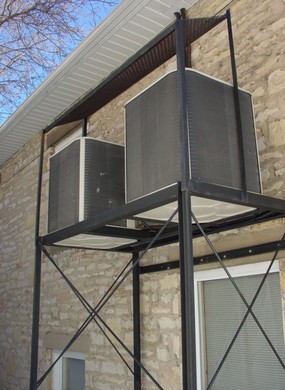Keeping cool, socially responsible and within your household budget during summer heat waves isn’t as straightforward as it used to be. A large part of the new challenge has to do with our love affair with air conditioning and its affect on electrical demand.
 If you’re equipping a new home, or adding air conditioning to your existing place, don’t automatically opt to turn your entire house into a fridge. Conditioning only key zones of your home can save more than 60% compared with whole-house systems, and recent advances make this frugal alternative more practical than ever.
If you’re equipping a new home, or adding air conditioning to your existing place, don’t automatically opt to turn your entire house into a fridge. Conditioning only key zones of your home can save more than 60% compared with whole-house systems, and recent advances make this frugal alternative more practical than ever.
While it’s true that traditional window air conditioners are economical to buy and quieter than ever, there’s an alternative for zone installations that offers more benefits, along with frugal energy use. Generically called a “ductless, split system”, these models separate key parts of the air conditioner, boosting performance, flexibility and quietness in the process.
All air conditioners include two main parts: a compressor that generates cooling action, and a system for delivering cool air to the room. On window units those two halves are attached together. And while this lowers cost, it also means you’ve got to have a window nearby for installation. You also need a tolerance for at least a moderate amount of noise.
Ductless split systems, on the other hand, separate the compressor and the indoor side of the equipment. All that goes in your house is a thin, louvered unit that can be mounted just about anywhere. Connection to the compressor (which can be mounted many yards away, outdoors) requires only a small hole in the wall. Split systems are quiet, frugal by design and don’t require the presence of heating ducts to operate. This is ideal for older homes or those without a furnace heating system to tie into. Some also come with air purifying filters and can operate as a heat pump, offering auxiliary warmth during cold weather. Couple this with a few well-placed ceiling fans and you’ve got a frugal system that makes any heat wave more bearable and affordable.
Then there’s always the smart and simple approach called the Two-Fan Challenge. Start by closing all windows, blinds and drapes first thing in the morning, except those needed for natural light. Minimize the use of appliances that generate heat during the day. Open all drapes and windows when outdoor temperatures drop after dinner. If there’s no breeze, use one window fan to bring cool air indoors and another to expel indoor air outside. Take precautions to deter unwanted entry into your home by opening second-floor windows or those in plain view.
 What difference will all this make? Quite a bit. Typical window fans draw about 100 watts of power each. If operated for 12 hours a day, two fans use a total of 2.4 kWh per day, costing you about $7 per month. Typical central air conditioners draw about 3500 watts of juice, totaling more than 60 kWh per day (or about $140 worth of electricity) per month. In the middle of these choices you’ll find that a 1000-watt zone air conditioner (either window or split system) typically use 18 kWh per day, costing just under $40 per month.
What difference will all this make? Quite a bit. Typical window fans draw about 100 watts of power each. If operated for 12 hours a day, two fans use a total of 2.4 kWh per day, costing you about $7 per month. Typical central air conditioners draw about 3500 watts of juice, totaling more than 60 kWh per day (or about $140 worth of electricity) per month. In the middle of these choices you’ll find that a 1000-watt zone air conditioner (either window or split system) typically use 18 kWh per day, costing just under $40 per month.
Since the beginning of time, humanity has struggled with a planet that rarely meets our physical needs as lavishly as we’d like. The defining accomplishment of the modern world has been to enhance our reality with machines, systems and technology. And as good as all this is, we now have to learn a brand new skill: voluntary technological restraint. Just because we can financially afford to consume all the resources necessary to pursue absolute comfort, entertainment and mobility, doesn’t necessarily mean it’s in our best long-term interests to do so. Global warming is one big example of this. Regardless of how difficult it is to practice frugality when our pocket book says “consume!”, that’s what we’re up against. Air conditioning is just one situation where we’re confronted by this conservation challenge. Live smart, choose well, think ahead and you can stay cool this summer without blowing a fuse.



